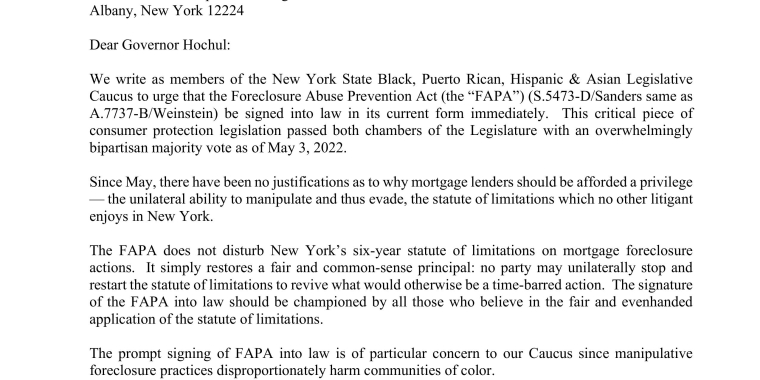
Senator Sanders Holds Hearing to Examine Modernization of CRA
June 8, 2018

New York – State Senator James Sanders Jr. (D-Queens) recently held a hearing on the Community Reinvestment Act, in response to the US Treasury Department’s recommendations on modernizing the law.
The CRA is intended to encourage depository institutions to help meet the credit needs of the communities in which they operate, including low- and moderate-income neighborhoods, consistent with safe and sound operations.
Back in April, the Treasury issued a formal memorandum to agencies highlighting several recommendations for updating and improving administration of the 41-year-old law.
The Treasury’s four key recommendations:
- Changing geographic assessment areas to reflect new technology and customer behavior.
- Increasing the transparency and flexibility of the assessment process
- Providing incentives for banks to lend to communities that have otherwise been overlooked previously particular low- and middle-income customers.
- Increasing evaluation and accountability of banks so they can better plan for the effective implementation of the CRA.
Senator Sanders believes the essence of the CRA should remain intact, but highlighted that more needs to be done to increase lending. The June 8 hearing was the first step in a greater conversation that Senator Sanders plans to continue in an effort to increase financial equity for all New Yorkers.
“We need to move in a powerful fashion,” Sanders said. “The current status of lending in low- to moderate-income communities is suppressing a large part of the population’s access to capital. Under those conditions, it is a clear threat to Democracy and an economic crime.”
Panelist Stella Adams, Chief of Equity and Inclusion at the National Community Reinvestment Coalition reported that lending disparities exist for black and Hispanic small business owners, citing that black-owned businesses make up about 2 percent of the total small businesses in New York City, and Hispanic-owned businesses comprise about 7 percent. She also noted that the population of New York City is 25 percent black and 29 percent Hispanic.
NCRC recommends that bank lending, investing, and service to people and communities of color must be considered on CRA exams. Only low- and moderate-income borrowers and communities are currently considered. There is no emphasis on race.
Adams testified that communities of color were the original neighborhoods redlined when Congress passed CRA in 1977. Since then, many remain disproportionately victimized by predatory lending and a lack of prime and conventional lending.
Clifford Rosenthal, former CEO of the National Federation of Community Development Credit Unions, suggested that a modernized CRA should encourage banks to invest more broadly in capital-deficient areas of New York State, including, but not limited to, rural areas. In this way, the CRA would produce more balanced economic development and access to basic financial services for low-income households statewide.
“If CRA is reformed in a meaningful way, people can start believing in the American Dream again,” Sanders said.
Also providing testimony at the three-hour hearing were: Jaime Weisberg, Senior Campaign Analyst at the Association for Neighborhood and Housing Development; Christie Peale, CEO of Center for NYC Neighborhoods; and Andy Morrison, Campaign Director at New Economy Project.
Share this Article or Press Release
Newsroom
Go to Newsroom


